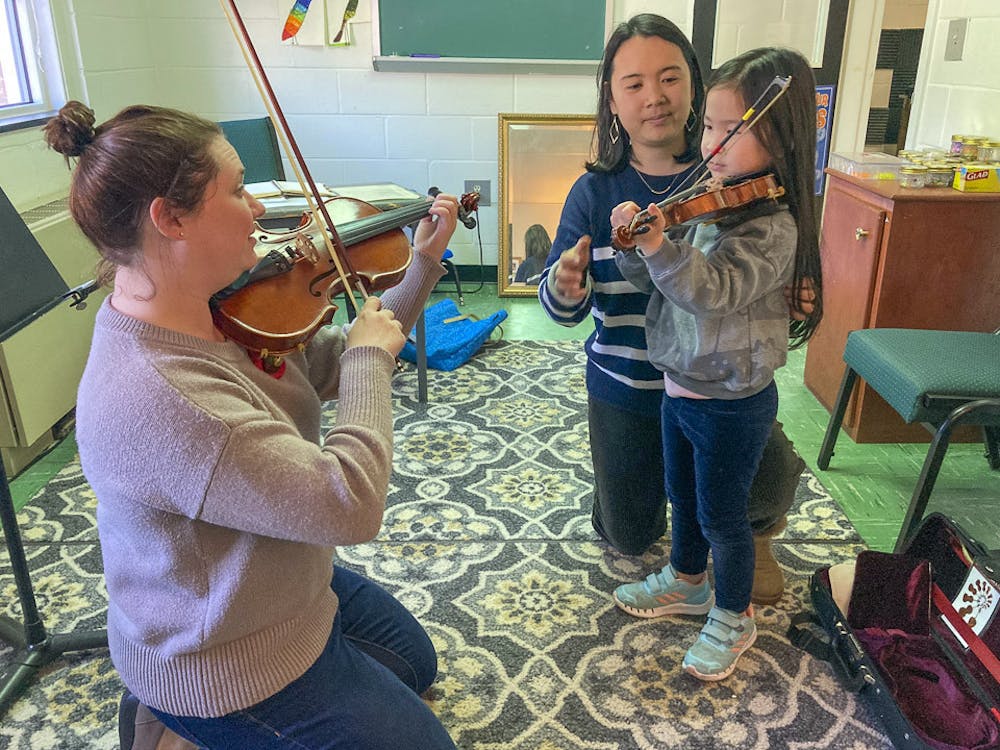Children from all over Columbia are coming together weekly to increase their musicality at the Suzuki Academy.
Though the kids come from different backgrounds, the academy works to help them support each other as they group up, forming bonds through music.
The Suzuki Academy of Columbia aims to strengthen the character and musical capacities of its students by using its own unique method of teaching.
The academy, founded in 2010, uses the Suzuki method of teaching which originates from Shinichi Suzuki, a Japanese violinist and teacher from the 20th century.
The method is meant to immerse students at a young age so they can be fluent in the language of music. Also known as the mother-tongue method, the idea is that, regardless of talent, everyone learns the language that constantly surrounds them and their environment.
The program started at USC's School of Music as one of the community music programs, although it's now a separate non-profit organization. Master of Music in Violin Pedagogy, is a degree program that is still connected with the School of Music and the Suzuki Academy. It also has a number of its performers over at USC
Parents are involved in all parts of the process to help their children learn the language of music faster. They learn, play and grow alongside their children, according to executive director of Suzuki Academy Sarah Evanovich. She said the the process is similar when a baby learns how to speak.
“They listen first, and then they’re just saying these short, little sounds that they repeat a lot. And they’re sort of praised for it, and the parents ask them to do it again," Evanovich said. "They gradually add words, and then later they learn how to read. It’s (a) very similar process but with music instead."
Sławka Ndubuisi, a homeschooled violinist who has been with the Suzuki Academy for 11 years, said the lessons she learned and the bonds she has gained from the program have been beneficial to her academic life.
“This program teaches a lot about coming for help," Ndubuisi said. "If you’re having trouble with your work (or) assignments and all that, they’re there to guide you and help you with things other than just music."
A key part of the Suzuki method, according to Ndubuisi, is just listening to music.
“When children listen to music constantly, it kind of gets ingrained in their head," Ndubuisi said. "I remember listening to our Suzuki CDs every night when we went to bed, and after a while, I knew the song pretty much backwards and forwards."
Along with parent-student instruction, the academy offers group classes with other students of the same age and skill level. Kristen Harris, a violin coordinator and instructor at the Suzuki Academy since 2011, said this creates a positive community where all students and families in the program come together to encourage and motivate each other.
Harris said she could not see herself doing anything else, as the satisfaction she gains from teaching is why she has stayed with the academy for so long.
“I just love watching students grow and getting to that point where they realize that they’re actually getting really good and can teach themselves to play anything they want," Harris said.
The academy currently has around 110 students, and Harris said it is steadily expanding, creating a growing need for teachers.
“We have a high demand for students now," Harris said. "One of the things that would be great is if we had more teachers in our area that were trained in the Suzuki method to help our program build even bigger."
Additionally, since it is the only organized Suzuki program in the state of South Carolina, the Academy wants to make itself more well-known. The program has grown since its founding, but there are still many people in Columbia who have never heard of it. Evanovich said the program is working on dealing with this issue.
“Having some more sponsors and donors and that sort of thing to get the word out about the program is one of the things that we’re trying to do,” Evanovich said.
While Harris said the Academy creates great musicians, the main point of the lessons is to give students the potential to continue growing and connecting with others.
“We’re not just a music school, and our philosophy is also based around character development,” Harris said. "A lot of our students do not go into music as a profession, but they have this lifelong ability to play with others and connect with other humans through music.”


